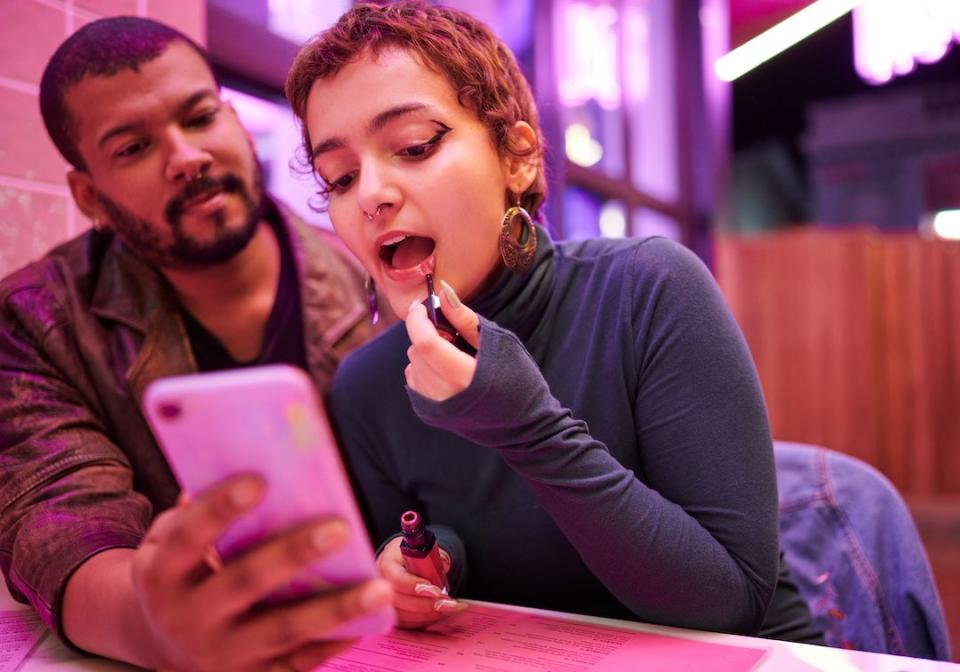Love languages you need to understand for a healthy relationship

If you've spent much time on social media, you'll have heard something about the five 'love languages'. The #LoveLanguage hashtag has more than 3.1 billion views on TikTok and counting. But what is a 'love language'?
Well, as we know, healthy relationships require open and honest communication. But there are certain ways to ensure your communication is 10/10 - and learning about love languages is a super handy way to do that.
The concept of love languages was popularised thanks to relationship expert Dr Gary Chapman, and his bestselling book The Five Love Languages: The Secret to Love That Lasts. The book acts as a guide for couples to help them identify, understand and then speak using their partner's 'love languages' - and it's thought to be the key to a happy and healthy partnership.
The five love languages are also something many relationship counsellors and therapists use in their work with couples. Although they don't use that term specifically, it's a framework by which they help couples understand each other more deeply - and therefore, hopefully, resolves conflict in relationships.
We obviously love an archetype, and self-identifying via star signs, Myers-Briggs personality tests and love languages is an easy way to find common ground and feel connected to other people. Most dating apps even have a prompt now that encourages you to share your archetype with a potential partner to see if you're likely to be a good match.

Gurpreet Singh, a relationship counsellor and expert at Relate explains that "in a relationship, peoples' styles of thinking are very different, so it would follow that what their needs in a relationship could be different," he says.
"Therefore, it’s important to understand what your partner’s language of love is. Because if you don’t know that, it’s likely you’ll get it wrong. And without wanting to, you might end up hurting each others’ feelings. Or, your actions might not be as well received as they would be if you spoke a language they understood."
What's my love language?
"There are two people in the relationship, their expectations are different, their needs are different, their way of communication is different," Gurpreet explains. "Everything about them is different. There are similarities of course, but opposites attract quite a lot. When you're attracted to someone that's different to you, it is almost necessary you will run into things about the person that grate on you. That’s always the way. Someone leaves the cap off the toothpaste and the other person gets irritated, all these things manifest themselves in relationships."
That's why, Gurpreet says, understanding each other's love languages can be vital to building and maintaining a healthy relationship. But first, it's important to have the 'building blocks' in place. "There needs to be love for each other, there needs to be trust, and there needs to be a desire to communicate with each other," he says.
"For example, in a good, healthy relationship, somebody saying, ‘You don’t tell me you love me,' is them talking about the language of love that's relevant for them. They're saying the love language known as ‘words of affirmation’ is really important."
The five love languages
Words of affirmation: Put simply, telling someone you love them or bestowing positivity with your words - praise kink unlocked. According to a 2010 study, this is the most common among the five love languages and reflects people who feel fulfilled and loved by someone’s expression of positive emotions.
Acts of service: How you demonstrate that you are thinking of someone. "You could open a door for them, or remember if they’ve eaten or not, or demonstrate some care for them," Gurpreet says. "Even remembering they love cheesecake, and bringing one home could be an act of service."
Receiving gifts: Gifts are very symbolic, he explains. "If somebody started talking about the value of gift, that would lead you down a different road. This gift is just about remembering someone." Although this is thought to be the most uncommon among the five love languages. Recent data from a 2023 US study seems to generally agree with this notion, as receiving gifts was the least Google-searched love language, amongst the five.
Quality time: Yep, it's about spending time with each other. Gurpreet often hears clients say their partner "can’t ever be bothered to sit with me". This is often down to technology. "It acts as a big deterrent in a relationships because people are often on their phones, and quality time tends to diminish, so that tends to lead to a lot of hurting these days," he explains.
Physical touch: Gurpreet's clients will often complain their partner never holds their hand, for example. "This can mean anything from sex to just holding hands, to stroking someone’s hand, kissing," he says. " Some people like a morning kiss and an evening kiss, and other people don’t necessarily need that."
How to identify your partner's love language
"Identifying your love languages is part of the communication process among the couple," Gurpreet says. "When counsellors see clients, we don’t ask them what their ‘language of love’ is specifically. Instead, we ask, 'What will make you feel loved and cherished in the relationship'?"
Their answer will fit into one of the above five languages, and you can use this to understand your partner. "It gives you a framework of understanding the other person’s needs," Gurpreet says. "It gives you some bullet points, and it's worth finding out, but it is not the gospel of love."
Essentially, you need a healthy amount of those five things, with a preference for one.
You should also remember that people speak more than one love language. Gurpreet explains, "If my language, for example, was quality time, does that mean I don’t like being touched? No. It’s that one language might be preferred, but there might be other things you enjoy as well in the relationship."
These days there are a whole host of new expressions of affection that some consider to be new love languages, like sharing memes, partnered travel and physical movement AKA gym dates or hitting the hiking trail together.

In fact, Paired relationship expert Moraya Seeger DeGeare says that when it comes to love languages, compatibility is not necessary. "If anything, having the same love language can cause more conflicts than having different ones. " she says. "This may not be what we typically think, but it's what I've observed in couples therapy. When both partners have the same love language, their demands may appear identical, but both may feel like they are not being understood because they both feel like they are not getting enough of what they need.
Especially when it is something like acts of service, I have seen a real imbalance in the relationship, everyone running around doing things for each other with no quality time or physical touch. So when the love languages are different, the partners are asked to show up in a way that might not be intuitive for them and that’s great!
We can really grow in long-term relationships, so learning to slow down and have quality time when that's not your love language can be very powerful and connecting. This is why taking the time to know the strengths of your love language and see the opportunities in it can help bring a nice balance to your intimacy."
Communication is everything in a relationship
It may sound obvious, but you should always make some time to talk. "People often think making time means turning up and being there," Gurpreet says. "But you need to be present. If you’re always on your phone when talking to your partner, that’s not being with them. If you start talking, and you’re always denying everything, that is not talking.
"Remember, there are two parts of communication, one is talking and the other is listening. If you’re only there to talk, it’s not going to work. If the relationship is important, then trying to understand what is important for your partner should be just as important to you."
It's also important to consider cultural and societal pressure for gender norms when discussing love languages. "For example, a male-identified person might feel that quality time as a love language is not considered manly enough and may instead say physical touch and sex when they are truly craving deeper emotional intimacy. Similarly, the demands on a mother can be so high that she may think acts of service are her love language when in reality it's physical touch" says Moraya.
"She may just be 'touched out' from constantly caring for her children, and her partner may get the wrong idea of how to show her love. Love languages, like many other aspects of a relationship, do not exist in a vacuum. The culture you grew up with most likely was more supportive of some over another. Like gift giving over physical touch.
Additionally, your capacity and support impact what feels connected in each stage of a relationship, particularly when navigating other significant life events such as parenting or physical and mental health challenges. Love languages remain relatively stable, but the priorities or needs may shift during different stages of life."
When it's time to seek help
Gurpreet explains it’s definitely worthwhile seeing a counsellor if you want to build a healthy relationship with your partner. But there are other signs it would be beneficial to seek professional help. For example, "If you have unresolved issues, or find your arguments are circular and you’re arguing about the same thing over and over again," he says.
"There are many other factors that contribute to a successful relationship" advises Moraya Seeger DeGeare, a relationship expert at Paired. "Shared values, communication styles, passions and interests - and understanding someone else’s love language doesn’t mean you have to match. Understanding your partner’s love language can help to strengthen your relationship - it can lead to greater intimacy, trust, and satisfaction in the relationship as you each know how you like to express and receive affection."
"If you have ‘incompatible’ love languages, try asking your partner therapist-approved questions like: 'What do you need from me in order to feel loved?' or approach subjects like: 'It makes me feel unloved when you…'."
If you're struggling with your partner, try this advice from Paired -
Do your own work
Your ideal partner will be most attracted to the version of you that you are most attracted to. This means constantly challenging yourself to show up as your whole, healthy self, at whatever stage you are in life. We are constantly evolving, and by showing up as someone who is striving to be the healthiest version of themselves, you can inspire your future partner to do the same.
Because don’t you want your partner to be most attracted to the healthy bits of you, flaws and all and not be drawn in by any toxic behaviours? Sharing your love language and being curious about your partner can be a part of this, as the vulnerability can lead to greater intimacy and understanding.
Talk to each other
Everything comes down to communication and has been identified as the biggest challenge in a relationship. 61% of Paired users stated that listening to each other is where the biggest improvement is needed in relationship health - being able to be open and honest with your partner and yourself about how you are feeling, can help you address any issues quickly and help you form a stronger connection.
Have similar values and goals
If you want a long-term relationship, it's important to have similar values and goals. This doesn't mean that you have to agree on everything, but you should have a general sense of alignment.
Listen to each other
We all go through struggles in our personal life outside of our relationships, whether it's work, family or friends, being the rock for your partner. Being able to be a shoulder to lean on is essential in showing how much you care for your partner. This is an area we can all work on, as over half of Paired users (56%) say showing gratitude or appreciation in a relationship is a key area which needs a big improvement. Respect each other’s boundaries and listen.
Resolve conflict effectively
Conflict is a normal part of any relationship, but it's important to be able to resolve it effectively. This means being able to communicate your needs and expectations and being willing to listen to your partner's.
Have fun together
A long-term relationship should be enjoyable. Make sure you have things in common that you can enjoy together and that you can make each other laugh.
You Might Also Like


